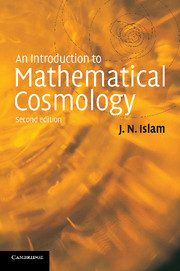Book contents
- Frontmatter
- Contents
- Preface to the first edition
- Preface to the second edition
- Dedication
- 1 Some basic concepts and an overview of cosmology
- 2 Introduction to general relativity
- 3 The Robertson–Walker metric
- 4 The Friedmann models
- 5 The Hubble constant and the deceleration parameter
- 6 Models with a cosmological constant
- 7 Singularities in cosmology
- 8 The early universe
- 9 The very early universe and inflation
- 10 Quantum cosmology
- 11 The distant future of the universe
- Appendix
- Bibliography
- Index
10 - Quantum cosmology
Published online by Cambridge University Press: 03 February 2010
- Frontmatter
- Contents
- Preface to the first edition
- Preface to the second edition
- Dedication
- 1 Some basic concepts and an overview of cosmology
- 2 Introduction to general relativity
- 3 The Robertson–Walker metric
- 4 The Friedmann models
- 5 The Hubble constant and the deceleration parameter
- 6 Models with a cosmological constant
- 7 Singularities in cosmology
- 8 The early universe
- 9 The very early universe and inflation
- 10 Quantum cosmology
- 11 The distant future of the universe
- Appendix
- Bibliography
- Index
Summary
Introduction
We saw in the previous chapters that the standard model predicts a singularity sometime in the past history of the universe where the density tends to infinity. In Chapter 7 we also saw there is reason to believe that the existence of singularities may not be a feature peculiar to the highly symmetric Friedmann models, but may exist in any general solution of Einstein's equations representing a cosmological situation. Many physicists think that the existence of singularities in general relativity is unphysical and points to the breakdown of the theory in the extreme situations that singularities purport to represent. Indeed, in these extreme conditions the quantum nature of space-time may come into play, and there have been suggestions that when the quantum theory of gravitation is taken into account, singularities may not arise. However, the quantization of gravitation is notoriously difficult – there does not, at present, exist any satisfactory quantum theory of gravitation, whether the gravitation theory is general relativity or any other reasonable theory of gravity. However, there have been some approximate schemes to try and answer at least partially some of the questions that a quantum theory of gravitation is supposed to answer. One of these schemes is quantum cosmology. We shall only give a brief and incomplete account of quantum cosmology in this chapter, as the technicalities are mostly beyond the scope of this book. This chapter is based mainly on Hartle and Hawking (1983), Hartle (1984, 1986), Narlikar and Padmanabhan (1983), and Islam (1993, 1994).
- Type
- Chapter
- Information
- An Introduction to Mathematical Cosmology , pp. 189 - 210Publisher: Cambridge University PressPrint publication year: 2001

